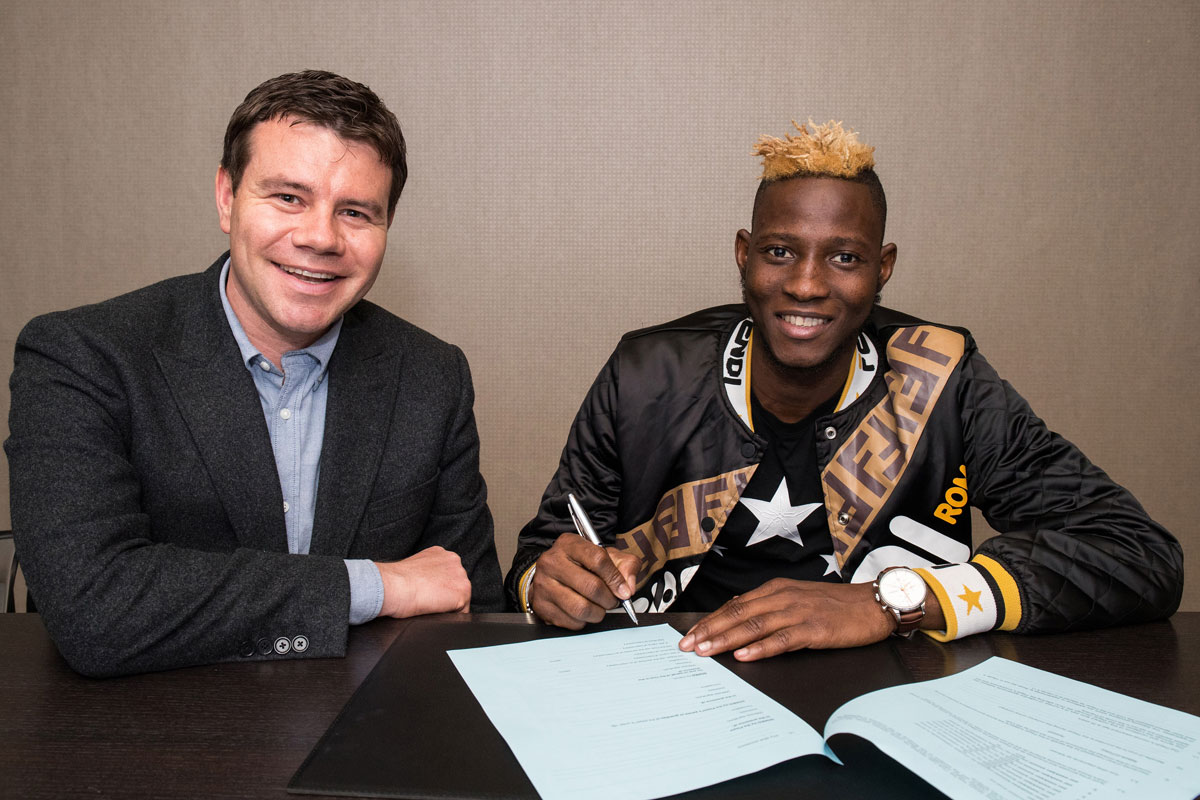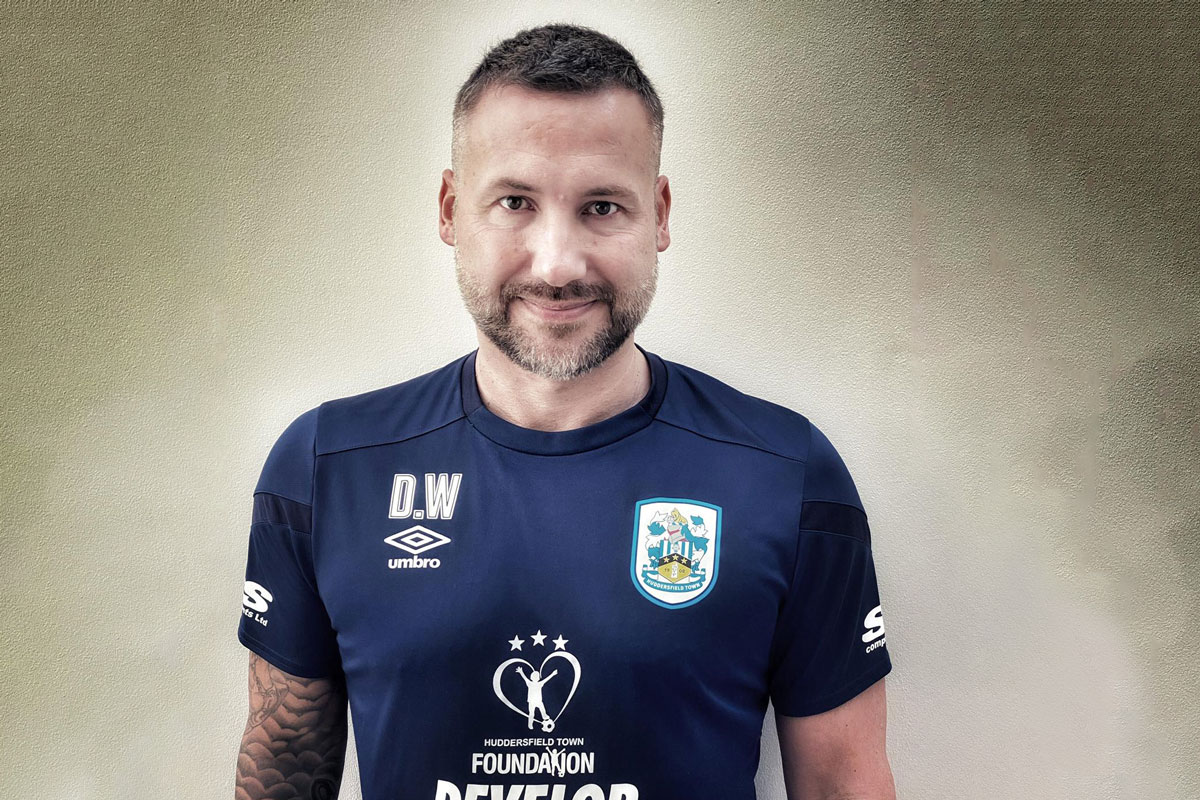David Webb has the dream job for any business executive with a love of the world game. He’s the glue that holds every element of a football club together; he helps football chairs achieve their dreams, football managers to find players and just about everything in between.
But he’s earned his envious role the hard way.
“My best moment in football was actually getting a full-time role,” he shares candidly. “It took me six years and 15 job interviews.”
David was made to wait, despite discovering Crystal Palace star player Wilfried Zaha as a scout a few years earlier when ‘Wilfie’ was playing kids football on a park in Croydon.
For non-football fans, that’s like going to a barren tourist goldmine and finding a 22-karat gold bar.
“I tapped into a little niche,” he recalls. “Not many clubs were looking for those street footballers with raw talent, and I helped Palace to have a different way of thinking.
“It also shaped my own thinking on recruitment.”
Fostering a unique skill

Since then, one of David’s greatest achievements in football has been to help Bournemouth rise through England’s lower divisions to the Premier League, on a minuscule budget, discovering more gems along the way.
Having fought his way to the top of his profession, he also works hard at refining his craft so that he can stay there. In the ongoing debate of whether leaders are born or made, he is the blueprint for nurture over nature.
Currently deciding on his next appointment, David treats his free time as an opportunity for further growth.
“I have a thirst for knowledge and when I’m not working, I’m consistently studying,” he explains. “I have an audiobook on the go, I’m reading a lot, networking, listening to podcasts and gaining knowledge from different industries.
“Football is my passion, but to be better at what I do, I have to take on so many elements. I read a lot on management, culture, philosophy and the psychology of human beings.
“Footballers are elite athletes, but they’re still human beings, they still have families. They still need love or kindness in certain situations. They’re just like us.”
“There might be a lot of money coming in to English football, but there still seems to be a lack of strong business practices within the game, especially in the face of emotional pressure from fans and the media.”
As a writer who also straddles the worlds of sport and business myself, that’s where David differs to anyone else I’ve interviewed in the world of football.
Yes, he has a passion for the game and played to a high standard, he has all of the coaching badges needed to be a Premier League coach, and he also has more than 20 years’ experience working with players and managers in the UK and overseas. However, David also talks about things such as people development, strategy delivery, managing innovation and the alignment of business goals.
There might be a lot of money coming in to English football, but there still seems to be a lack of strong business practices within the game, especially in the face of emotional pressure from fans and the media.
Thirty years ago I wrote a dissertation for my accounting degree about the ‘Ownership and Control of English Football Clubs’, arguing that ex-football players were ill-equipped to negotiate contracts or manage budgets. People in David’s role didn’t exist back then; thank goodness they do now, despite the reservations older football pundits might have.
“It’s hard for old-school managers to accept the Sporting Director role,” David acknowledges. “Historically, they’ve wanted to manage the whole club.
“That’s just not sustainable in the modern game with the demands of bigger clubs. The coach is there to be successful on the pitch; he doesn’t want to get consumed with the politics and demands of other departments.”
One of the game-changers for the way David approaches his role came during a European study visit to German club Bayer Leverkusen while obtaining his FA Academy Managers Licence back in 2008.
“I’m a big fan of the German system in terms of how they develop coaches, players, even people and staff,” he shares.
“The coach has to match the philosophy of the club. The club decides on an identity, how they develop players, the type of football they want for their fans, and then a coach has to fit into that, rather than the other way round.
“The club is far bigger than any one person and they stick to the plan. I’d never seen that before, especially in England, where the manager normally dictated everything at the club.
“They believe in the system they have and they’re brave enough to stick to it – that’s the difference. It’s quite simplistic, it’s not rocket science, but they’re brave enough to stick with it and say this is who we are.”
One wonders if it’s something that might have served Manchester United well in the past decade since Alex Ferguson departed. David is quick to agree.
“There’s been a billion pounds in turnover of players since Ferguson left, with little success, and three vastly different managers.
“If they were going to make a cultural shift, they could have put in a sporting director and tried to continue Ferguson’s philosophy – keeping the essence of the club, having a playing style that fits that, a framework to support the manager and maintain the cultural alignment.
“But they’ve had three different personalities, philosophies and playing styles.”
Reinventing the business of sport

Very often in interviews with people from the world of sport, when writing in a business context, the emphasis is on what business can learn from sport – I’ve written pieces like that myself on leadership and culture. Talking to David, though, you get a sense that he is actually in the reverse scenario; that he is helping the world of football to understand the world of business from the inside.
Southampton and Brighton are two clubs that David identifies as doing things the right way: developing youth, not buying big, having a plan that the coach buys into, and a philosophy that everyone at the club understands.
“It makes them sustainable going forward,” David says. “If a coach leaves, they’ll bring in another coach that fits the model. They keep that machine turning, rather than going for a complete cultural shift.”
Southampton provided an extreme example of that last year, which impressed David hugely.
“They lost 9–0 to Leicester in 2019, but two weeks later offered their Austrian Manager Ralph Hasenhüttl a new four-year contract, showing that they’re not going to chop and change based on a few bad results.”
Like most businesses, sticking to the plan needs to come from the very top – in the case of football clubs, that’s the owner or chair.
“At Huddersfield, I was recruited by the new owner,” David says of his last role. “He came in and wanted a style of football that reflected the hardworking Northern town’s community – so a team that was hardworking, passionate and had desire.
“Those were the basics and it was about building a culture in the image of that. A culture that reflects what the club is and what it means to the supporters.
“Then align everything at the club and all the support departments around that, and recruit a manager who will fit with that.”
In the fickle world of football, that can change quickly though, and chairs can easily be swayed by the elusive seduction of a potential silver bullet. José Mourinho’s ill-fated short stay at Tottenham (one of David’s previous clubs) is a perfect example.
“When Daniel Levy employed José Mourinho at Spurs, he got a Manager with an incredible track record, but one with a completely different philosophy to his predecessor Mauricio Pochettino,” David explains.
“Pochettino plays attacking football with a culture of bringing on young players. He really believes in people, having trust in them and being kind. He makes people feel valued and gives them ownership.
“I’ve never worked with José Mourinho, but in terms of a playing philosophy, he has a completely different mindset.”
The underlying implication is that players bought for one purpose have to be sold and replaced at a cost of millions. That’s something which can be avoided with the consistency and continuity that David advocates.
“I imagine the players and probably the staff would have had to shift their mindset completely as well,” he adds.
It’s clear that the core of David’s success comes from understanding people and having a real interest in that.
“Definitely,” he agrees. “To be successful, you have to understand your people and what’s at their core.
“Everyone wants to feel valued, feel they’re improving, that they have some personal development, that they have different rewards – attainable goals.
“That they’re challenged and part of the team.”
That goes for everyone at the club, but especially the players who David is employed to scout and recruit. Data on players is now widely available and while he is a fan, he still believes in the human aspect of the job.
“Data can go as deep as you want it to go. You can really filter down to the fine detail of how you want data to work for you,” he points out. “But it has to work harmoniously with your scouts – you still need both.
“You can’t take anything away from the intuition or feel of a good scout. Those natural instincts are integral when combined with good data.”
A master’s degree in sports psychology has certainly helped David in the area of people’s character. After football, understanding how people tick is probably his greatest love.
“I’ve always been fascinated by the character and social side of football, having already become comfortable with the coaching and athletic side,” he shares.
And David goes to every length to make sure he’s getting the right cultural fit for his playing staff, as well as the given that they’re a skilful and fit player.
“There are lots of ways you can do surveillance: social media, their youth playing history, how they were brought up,” he reveals.
“And I’m looking for consistency through their progression, because that is a link to resilience. Motivation can be quite temporary, but if you keep doing it over a consistent period then it shows progression.
“It shows a work ethic and resilience in their character.”
And why is that so important?
“A player might have great talent, but are they a good cultural fit for the environment you’re putting them into?” David questions.
“When you bring a player into a dressing room, it’s somewhere that is sacred to managers, and you have to know whether the player is going to bring value to the group with their character.”
Like many businesses, that involves succession planning for the short- and long-term, and the development of potential talent at a lower level.
David treats a club budget like his own money and hates being involved in the knee-jerk decisions that some clubs make on Transfer Deadline Day – often wasting millions on players that they haven’t done the due diligence on.
“Deadline Day signings can be exciting for the fans, but it just shows bad management,” he suggests. “The stress can be avoided with good planning. It’s not sustainable if you’re buying players on an emotional basis. It’s horrible.”
Virtues of goal scoring
Having taken up way too much of David’s time and dropped way too many hints that maybe I’d like a job in his industry, we start to wrap things up. A few more nuggets of gold are thrown up as we wind things down, though.
First, that arguments are healthy.
“There’s always disagreements and there’s nothing wrong with that. When you’re in these positions you’ve got strong characters and there will be different opinions, but as long as it’s healthy and not too emotional or irrational, that’s OK. As long as they are reasonable arguments about how this will improve us and take us forward, that’s OK,” he says.
And also that patience is undervalued.
“Patience can be such a powerful tool. Things change in life and football so quickly, and that can lead to knee-jerk emotional decisions. Patience is really undervalued.”
Finally, what’s next for David?
“I love building things,” he says enthusiastically. “Building an identity, a philosophy, a style of play that resonates with the fans. Something that makes them feel passionate, excited and positive about their club.
“Then building frameworks around that to create sustainability. Including player and academy progression, which builds success over a period of time.
“I’d like to continue as a Head of Football or Sporting Director, building a long-term project at a football club, in an environment where my skill set can help drive a club forward.
“I’ve had two or three good discussions with clubs in the UK and abroad, but haven’t made any decisions yet.
“I’m looking for a really exciting project I can get my teeth into.”
You can bet that David will absolutely devour whatever he does next. But he’ll do so with discipline, planning, great communication with all levels of the business, and within a budget and philosophy that suits the club he’s at.
He could easily work in any industry, but business’s loss is currently football’s gain.
Read next: How this 32-year-old sports partnerships expert closes US$100 million deals







